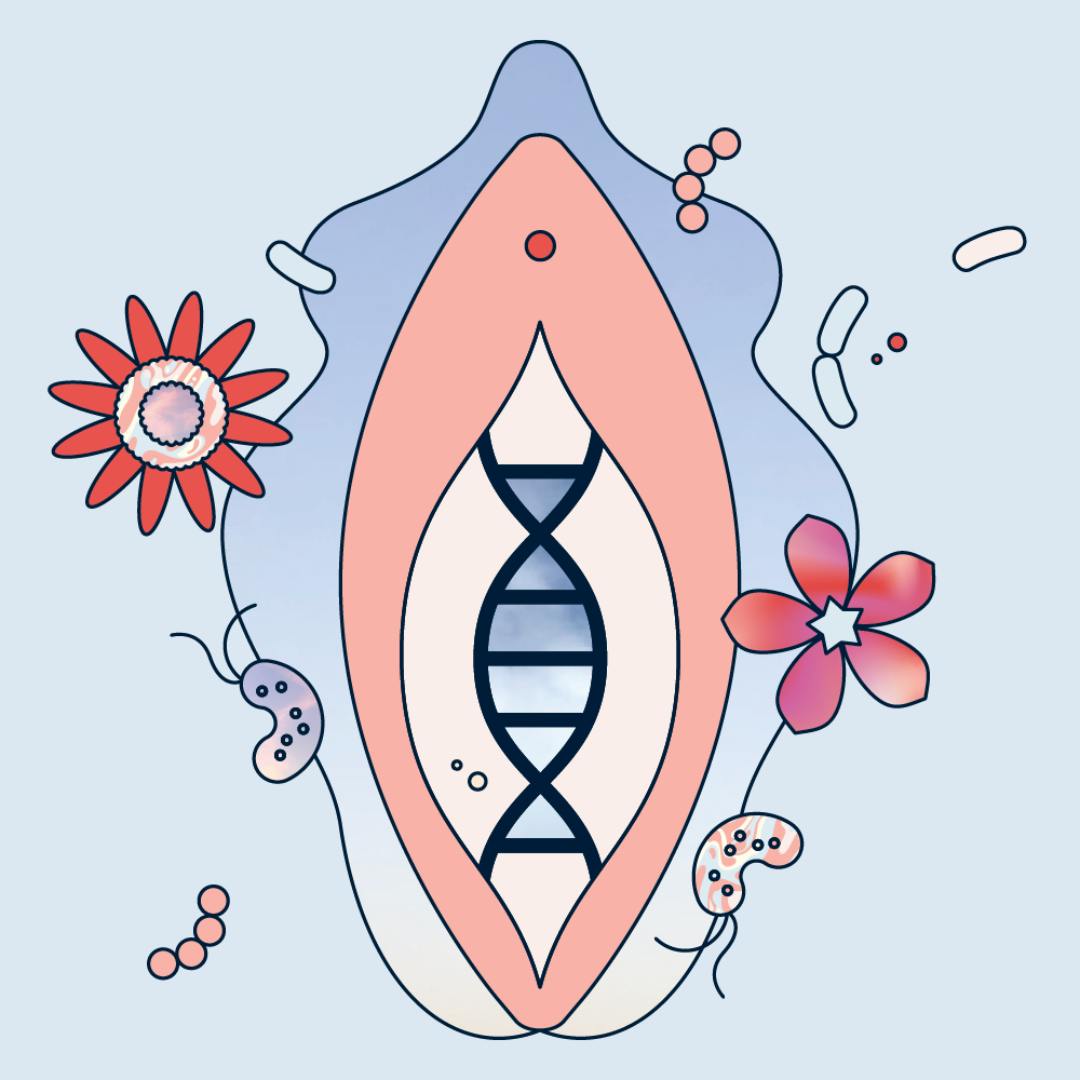If you’ve ever been warned by a friend who learned the hard way that you should never, ever douche the vagina: the words ‘vaginal microbiome’ likely came up in that conversation.
If you’ve ever Googled your thrush symptoms late into the night, the words ‘vaginal microbiome’ probably swam in front of you on the screen. If you’ve ever approached your GP because you think there’s a chance you may have bacterial vaginosis (BV): well, they doubtless mentioned a disrupted vaginal microbiome.
What we’re saying is: if you’ve got a vagina, you most likely know a little about vaginal microbiome (also known as microbiota). But a healthy vaginal microbiome is too important to only know a little about: not least because of the impact it can have on fertility, and your overall gynaecological health.
We need to know our vaginal microbiome; and we need to be talking about it. It’s time for lactobacilli to become the household name it’s always deserved to be.
What exactly is vaginal microbiome?
Essentially, it’s the make-up of your vaginal flora. “Vaginal microbiome describes the bacteria and other organisms normally found in the vagina,” says Tara Scott MD.
“The term refers to a diverse community of microorganisms, mainly dominated by bacteria, associated with the skin and mucous membranes of the female genital tract and therefore present in the vagina,” adds Dr. Zahra Ameen, Consultant Gynaecologist and Obstetrician at the Cadogan Clinic.
What Constitutes A Healthy Vaginal Microbiome?
One word: lactobacillus, the ‘good’ bacteria. Trust us when we say you want a lot of it in the vagina; and, all things being well, you should. “Lactobacilli are the most abundant vaginal bacteria in women, producing lactic acid thereby keeping the pH of the vagina stable between 3.5 - 4.5,” Dr. Ameen explains. The lactic acid is crucial: stable pH levels in the vaginal microbiome are vital for optimal gynae health.
Dr. Ameen is quick to point out that “the vaginal microbiome constantly undergoes fluctuations during a woman’s menstrual cycle and during her entire life”. But for prime vaginal health, you ideally want 90-95% of lactobacilli, together with L. crispatus, L. iners, L. jensenii and L. gasseri: all what Dr. Ameen describes as “the main gate-keepers of the vaginal ecosystem”.
When it comes to the benefits of a healthy vaginal microbiota (and, by definition, for vaginal health): well, there are many.
You’re better protected against parasites and harmful bacteria. “Some lactobacilli produce hydrogen peroxide, which has been shown to inactivate [...] trichomonas vaginalis and E. coli [among others],” Dr. Ameen explains.
- You’re more protected against thrush and BV. “If the pH of the vagina increases, the quality or amount of lactobacilli can fall and other bacteria can multiply,” says Dr. Ameen. “This can result in infections such as [BV] or thrush.”
- And by dint of being protected from BV, you’re protected against STis, too. “BV [...] can have other adverse effects on women’s health such as [...] the acquisition of certain types of sexually transmitted infections such as gonorrhea, chlamydia and herpes,” says Dr. Ameen.
- You’re protected against UTIs. “A healthy vaginal microbiome is involved in urinary health, and if this is off it can contribute to [...] frequent UTIs,” says Dr. Scott.
- There’s even research to suggest that higher levels of lactobacillus could be associated with a lower risk of developing ovarian cancer.
And one of the most significant benefits of a healthy microbiata? It could help preserve your fertility.
What’s The Link Between Fertility and the Vaginal Microbiome?
The importance of the ‘right’ bacteria for fertility can’t be underestimated. For one thing, a healthy microbiome can reduce the risk of sperm dying before they reach a healthy egg.
“An imbalance of healthy bacteria in the vaginal microbiome can influence fertility,” says Dr. Ameen. “Having a healthy balance is important for the successful fertilisation, implantation and embryo development. It is thought to reduce antisperm immunity – an immune system which attacks sperm.”
And then there’s the potential link between a healthy vaginal flora and the prevention of preterm birth (and other pregnancy complications). One study, for example, has posited that “high abundance of Gardnerella combined with low abundance of Lactobacillus might be particularly predictive of preterm birth”.
Dr. Ameen also pointed out that BV – which, as we know, occurs when the vaginal microbiome is imbalanced – “can have [...] adverse effects on women’s health such as increased risk of miscarriage, pre-term birth, infection in labour [and] pelvic inflammatory disease”.
Ultimately, though, there are a great many reasons for why someone might struggle to conceive or encounter pregnancy complications such as preterm birth; and if you’re at all concerned, you should always make an appointment with a healthcare professional as soon as you can. Plus, Daye’s vaginal microbiome screening service allows you to connect with vetted, empathetic physicians – and they can offer guidance on infertility, miscarriage, preterm labour and ectopic pregnancy, among other areas.
So: how can I test my vaginal microbiome?
Hopefully, we’ve made it pretty clear that a healthy vaginal microbiome is of the utmost importance. So if you’re wanting to test your own vaginal flora for optimal gynae health (and why wouldn’t you?), you’re in luck: Daye’s Vaginal Microbiome Screening is now available.
We know ‘simple’ and ‘non-invasive’ aren’t words you typically associate with a vaginal exam; but that’s why we’re here. It’s as easy as just using and sending back your trusted Daye tampon, and Daye’s lab will do the rest: analysing your tampon for any microbiome imbalances.
Find out more here. If you do have an imbalance, it’s best to know now; and in such a case, you’ll get an online result with a range of aftercare options to pick from.







